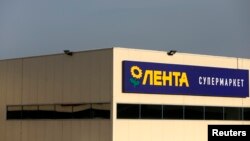MOSCOW —
Russia's prime minister said on Monday he hoped to raise more than $5.5 billion this year by selling stakes in state companies, reviving a delayed privatization program that could spur a flagging economy.
At a meeting with deputy prime ministers, Dmitry Medvedev also sounded a note of caution, saying the sale of shares in companies such as Rostelecom or shipping group Sovcomflot could happen only in good market conditions.
Launched in 2010 by then Finance Minister Alexei Kudrin, the $50-billion privatization drive to reduce the state's direct role in the economy and improve a much-criticized investment climate has been dogged by delays.
Assets have since been removed from the lists, prey to volatile markets and a tug-of-war between more liberal-minded politicians and hardliners favoring a slower approach to privatization.
“Just this year, we have a quite serious privatization plan to raise 200 billion roubles ($5.7 billion), and I hope that these plans will be fulfilled,” Medvedev told the meeting.
“[The approach to privatization] should be balanced. We should not delay but at the same time we should consider the economic circumstances in the world and in the country.”
Russia's economic growth has slowed, reaching just over 1 percent last year after hitting an average 7 percent before the 2008/09 financial crisis. Privatization revenues would help meet generous election promises made by President Vladimir Putin.
Last June, Russia halved its privatization target for 2014 to around $5.5 billion after many previously planned sales were stalled because of adverse market conditions.
The results of the sales so far have been mixed.
Divisions
Sberbank, Russia's largest bank, attracted strong investor demand for its stake sale in 2012, raising more than $5 billion, and the country's second-largest bank, VTB, last year won sovereign backing for a $3.3 billion share issue.
But a 16 percent stake in state diamond miner Alrosa was priced at the bottom of a planned range, valued at $1.3 billion, in October.
The main sell-off penciled in for 2014 is a stake in Rosteleom, which competes with Russia's three main private mobile operators - MTS, Megafon and Vimpelcom . Rostelecom recently merged its mobile assets with VTB's Tele2 Russia mobile unit into a single company, T2 RTK Holding.
Olga Dergunova, head of the State Property Agency, told the meeting Russia expected to receive 150 billion roubles from that sale and the privatizations could start in the second quarter with Sovkomflot. She did not disclose the amount expected to be sold in Rostelecom.
State capitalists such as Igor Sechin, the head of state energy company Rosneft and a long-time ally of Putin, oppose privatization - including of his own company.
The state had been planning to sell its stake in Novorossiisk Commercial Sea Port (NCSP) by the end of 2013. Rosneft asked Putin in October to sell it the state's 20 percent stake.
A further stake in VTB is due to be sold in 2015.
At a meeting with deputy prime ministers, Dmitry Medvedev also sounded a note of caution, saying the sale of shares in companies such as Rostelecom or shipping group Sovcomflot could happen only in good market conditions.
Launched in 2010 by then Finance Minister Alexei Kudrin, the $50-billion privatization drive to reduce the state's direct role in the economy and improve a much-criticized investment climate has been dogged by delays.
Assets have since been removed from the lists, prey to volatile markets and a tug-of-war between more liberal-minded politicians and hardliners favoring a slower approach to privatization.
“Just this year, we have a quite serious privatization plan to raise 200 billion roubles ($5.7 billion), and I hope that these plans will be fulfilled,” Medvedev told the meeting.
“[The approach to privatization] should be balanced. We should not delay but at the same time we should consider the economic circumstances in the world and in the country.”
Russia's economic growth has slowed, reaching just over 1 percent last year after hitting an average 7 percent before the 2008/09 financial crisis. Privatization revenues would help meet generous election promises made by President Vladimir Putin.
Last June, Russia halved its privatization target for 2014 to around $5.5 billion after many previously planned sales were stalled because of adverse market conditions.
The results of the sales so far have been mixed.
Divisions
Sberbank, Russia's largest bank, attracted strong investor demand for its stake sale in 2012, raising more than $5 billion, and the country's second-largest bank, VTB, last year won sovereign backing for a $3.3 billion share issue.
But a 16 percent stake in state diamond miner Alrosa was priced at the bottom of a planned range, valued at $1.3 billion, in October.
The main sell-off penciled in for 2014 is a stake in Rosteleom, which competes with Russia's three main private mobile operators - MTS, Megafon and Vimpelcom . Rostelecom recently merged its mobile assets with VTB's Tele2 Russia mobile unit into a single company, T2 RTK Holding.
Olga Dergunova, head of the State Property Agency, told the meeting Russia expected to receive 150 billion roubles from that sale and the privatizations could start in the second quarter with Sovkomflot. She did not disclose the amount expected to be sold in Rostelecom.
State capitalists such as Igor Sechin, the head of state energy company Rosneft and a long-time ally of Putin, oppose privatization - including of his own company.
The state had been planning to sell its stake in Novorossiisk Commercial Sea Port (NCSP) by the end of 2013. Rosneft asked Putin in October to sell it the state's 20 percent stake.
A further stake in VTB is due to be sold in 2015.





